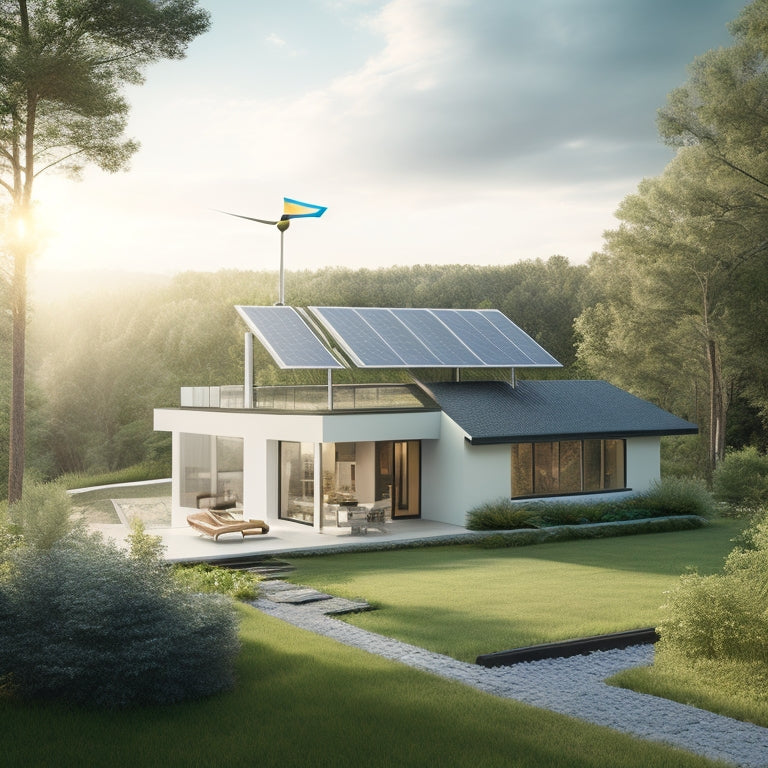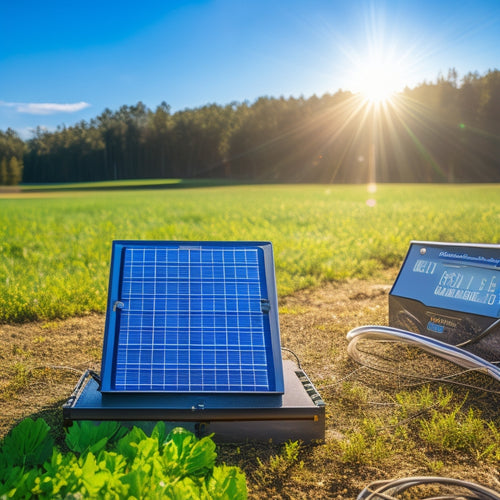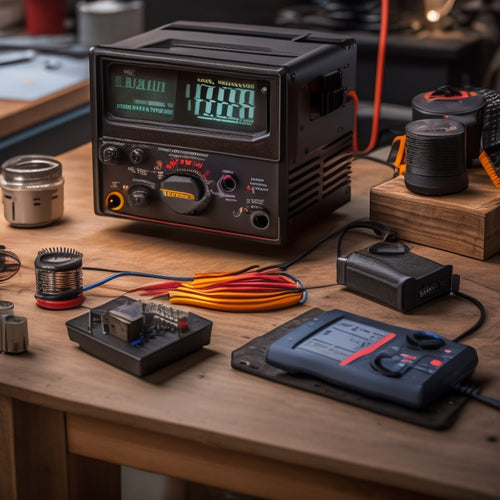
Top Home Energy Independence Panel Options
Share
When it comes to achieving energy independence, you're looking for top-rated solar panels that deliver reliable power and reduce your grid reliance. You should consider high-efficiency monocrystalline or polycrystalline panels with UL or IEC certifications, which guarantee durability and consistent power output. Additionally, think about energy storage solutions, like lithium-ion batteries, to optimize your energy usage during nighttime or outages. By pairing these with smart technology and system optimization, you'll maximize your solar energy potential. Now, investigate the different options and considerations to find the perfect fit for your energy independence goals.
Key Takeaways
- Choose high-efficiency monocrystalline solar panels with UL or IEC certifications for optimal energy generation and reliability.
- Consider energy storage solutions, like lithium-ion batteries, to utilize excess energy during nighttime or outages.
- Look for smart technology integration with real-time monitoring and optimization for energy production and system optimization.
- Select a portable power solution that can be tailored to specific needs, from critical loads to entire home support.
- Opt for a high-efficiency solar solution that pairs advanced technology with energy storage for maximum energy independence.
Best Solar Panels for Home Use
Top-tier solar panels for home use typically boast high efficiencies, durable builds, and competitive pricing.
When selecting the best solar panels for your home, you'll encounter various types, including monocrystalline, polycrystalline, and thin-film panels. Monocrystalline panels offer high efficiency, while polycrystalline panels provide a cost-effective alternative. Thin-film panels are a budget-friendly option, but with lower efficiency.
Take into account the installation site's orientation, shading, and local building codes when choosing the right panel type. It's crucial to select high-quality solar panels with certifications from UL or IEC to guarantee durability and consistent power output.
You'll also need to take into account the installation method, such as roof-mounted or ground-mounted systems, and the necessary inverters and mounting hardware.
Top Energy Efficient Options
When evaluating solar panels for home energy independence, you've likely thought about the significance of high-quality panels with certifications from UL or IEC.
Beyond panel quality, you'll want to take into account energy efficient options that maximize your energy harvest. Look for systems that incorporate energy storage solutions, allowing you to store excess energy generated during the day for use at night or during power outages.
This is particularly important when evaluating battery lifespan and performance, as high cycle ratings provide better long-term value. Additionally, top brands like Tesla and LG retain up to 80% capacity after 10 years, with rigorous testing enhancing trust in product longevity.
Smart technology integration is also essential, enabling real-time monitoring and optimization of your energy production. With smart inverters, you can track your energy output, identify areas for improvement, and make adjustments to optimize your system's performance.
Portable Power for Homes
You've likely considered the benefits of having a backup power source for your home, especially during extended grid outages.
Portable power solutions can provide off-grid energy independence, ensuring your essential appliances remain operational. With the ability to reduce operational costs by up to 90% and lower carbon footprints cost-effective solution, energy storage systems, such as lithium-ion batteries, can be paired with portable generators or solar panels to provide a reliable power supply.
These systems can be scaled to meet your specific needs, from powering a few critical loads to supporting your entire home. Look for solutions with advanced energy management systems to optimize performance and efficiency.
With portable power, you can enjoy peace of mind knowing you're prepared for any grid outage or natural disaster, and can even take your energy independence on the go.
High-Efficiency Solar Solutions
Most homeowners seeking energy independence recognize the importance of utilizing renewable energy sources.
When it comes to high-efficiency solar solutions, you'll want to investigate advanced solar panel technologies that maximize energy output while minimizing space requirements. Look for high-efficiency panels with power outputs exceeding 400 watts, as these can greatly reduce the number of panels needed for your system.
Additionally, consider pairing your solar panels with energy storage solutions, such as lithium-ion batteries, to store excess energy generated during the day for use during the night or on cloudy days.
This combination will enable you to tap into the full potential of solar energy and achieve greater independence from the grid.
Renewable Energy for Homes
Over 80% of homeowners seeking energy independence prioritize renewable energy sources to reduce their reliance on the grid. As you investigate renewable energy options for your home, you'll find that wind energy and energy storage are vital components. Wind energy utilizes the power of wind to generate electricity, while energy storage systems like batteries guarantee a steady supply of power when the wind isn't blowing.
| Renewable Energy Source | Benefits | Challenges |
|---|---|---|
| Solar Energy | Zero emissions, abundant resource | Intermittent power supply, high upfront costs |
| Wind Energy | Low operating costs, scalable | Noise pollution, visual impact |
| Geothermal Energy | Reliable, consistent power supply | Limited geographic suitability, high upfront costs |
| Hydro Energy | High energy conversion rate, reliable | Dependent on water resources, high upfront costs |
| Biomass Energy | Renewable, carbon neutral | Land use competition, air pollution concerns |
Frequently Asked Questions
Can I Install Energy Independence Panels Myself, or Do I Need a Professional?
You can attempt a DIY installation, but it's essential to take into account safety concerns, such as electrical shock and roof damage risks, before deciding; if you're not experienced, it's recommended to hire a professional to guarantee a safe and efficient installation.
How Long Does It Take to See a Return on Investment for Energy Independence Panels?
You'll typically see a return on investment for energy independence panels within 5-10 years, depending on your location and system size, with financial incentives like tax credits and rebates shortening your investment timeframe.
Are Energy Independence Panels Resistant to Extreme Weather Conditions Like Hurricanes?
Like a fortress standing strong against invaders, you'll want your energy independence panels to withstand Mother Nature's fury. Fortunately, most panels boast impressive storm resilience and weather durability, withstanding hurricane-force winds and heavy precipitation, ensuring your investment remains intact and functional.
Do Energy Independence Panels Require Regular Maintenance to Function Efficiently?
You'll find that energy independence panels do require regular maintenance to guarantee ideal energy efficiency; it's essential to establish a maintenance schedule, including inspections and cleaning, to prevent performance degradation and maximize your system's energy output.
Can I Use Energy Independence Panels in Conjunction With My Existing Energy Grid?
As you weave a fabric of energy freedom, you're wondering if you can harmonize your independence panels with the existing grid. Yes, you can integrate them, leveraging grid integration and energy storage to balance supply and demand, ensuring a seamless orchestration of power.
Related Posts
-

Top 10 Off Grid Camping Gear Must-Haves
When you're off-grid camping, the right gear is crucial for a smooth expedition. Start with a durable, weather-resist...
-

Choosing the Right Solar Power Charge Controller
Choosing the right solar power charge controller is crucial for maximizing energy efficiency and extending battery li...
-

Key Features of a DC to AC Converter
A DC to AC converter features high efficiency and conversion rates, which reduce energy costs and improve performance...


